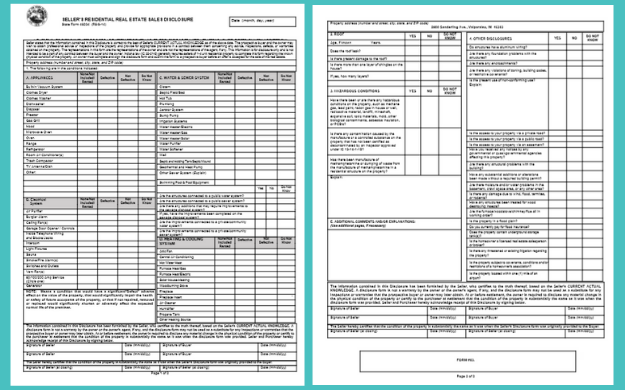What Is A Disclosure In Indiana: Home Selling Process
American author Mark Twain is often credited with saying, “It ain’t what you don’t know that gets you into trouble. It’s what you know for sure that just ain’t so.”
What this means is do not blame your troubles on ignorance because ignorance is not the cause. False knowledge and misunderstanding is what really causes the problems. And, the State of Indiana seems to agree. Well, it does at least when it comes to selling a home.
Indiana requires all sellers of a residential property of four units or less to complete the Indiana sales disclosure form, formally known as the Seller’s Residential Indiana Real Estate Sales Disclosure State Form 46234.
This article will answer your questions about Indiana sales disclosures rules. I’ll answer what is disclosure, specifically, what is a property disclosure, what are home sellers required to disclose, what do you need to disclose when selling a house, and some additional general tips. Lastly, I have included a copy of the Indiana residential real estate disclosure form.
Oh yeah, before we get started, I am not a lawyer. I am a licensed Indiana real estate agent. Don’t take this as legal advice. If you are needing legal advice regarding a real estate transaction disclosure form or are in a legal dispute regarding the Indiana sales disclosure rules, call a lawyer. My lawyer said I had to say this.
What Is Disclosure?
Disclosure, and more specifically, property disclosure in real estate sales, is the act of the seller disclosing his or her “actual current knowledge” as of the date on the form regarding the condition of the property.
What Is A Disclosure Form?
The form is the tool by which disclosure is made. The seller discloses his or her actual current knowledge on about 60 features of the home. This memorializes (fancy legal word there) the seller’s knowledge in writing. Sellers are required to complete the form before accepting an offer from a buyer.
The seller is required to complete the form on all residential real estate unless the property is a multi-unit residential property of more than four units. There seems to be an exception for brand new construction homes, too, but I have not seen this in the Indiana code.
And, yes, the seller is required to make an earnest effort to complete this form even if he or she has never lived at the property. There is a “Do Not Know” column for a reason.
Download The Indiana Sales Disclosure Form Here
I have included a copy of the Indiana Sales Disclosure form here which you can download.
Complete all sections on the Indiana sales disclosure form, and sign at the bottom. Indiana law requires you to give a buyer this completed disclosure before accepting an offer.
Additionally, the seller must sign the Indiana sale disclosure form again at closing to attest the statements in the disclosure are still true and that the property is in the same or better condition than when the form was completed.
Click here to download the Indiana Sales Disclosure Form.
What Are Home Sellers Required To Disclose?

1. Appliances
The seller is asked about appliances. Most common appliances are covered. There are additional blanks for any appliances coming with home but not explicitly stated on the form. The seller’s options to describe the appliances are: None / Not Included, Not Defective, Defective, or Do Not Know.
2. Electrical System
The seller is asked a battery of questions regarding the electrical system. Essentially, the seller is describing whether the major electrical components are in working order. Again, the seller’s options are: None / Not Included, Not Defective, Defective, or Do Not Know.
3. Water & Sewer System
In this section the seller is required to answer questions about the plumbing, water source, and wastewater disposal. As a home buyer, it is especially important to look at this section to understand if the home has a septic system.
4. Heating & Cooling System
The seller will answer questions about the type of and functionality of the home’s heating and cooling systems. This helps the buyer understand the type of heating system, too.
5. Roof
The seller is asked about the integrity of the roof, whether there are active leaks and more than one layer of shingles, and the seller is asked to disclose the age of the roof if it is known.
6. Hazardous Conditions
Here the seller needs to detail whether any known hazardous conditions relating to biohazards, chemicals, or natural but harmful substances, are known to be present on the property. There are also a couple of questions related to whether the property was used for the production of or disposal of substance and equipment related to methamphetamine production.
7. Other Disclosures
This is a more general section that asks general questions about the property. The possible answers in this sections are: yes, no, or do not know.
Tips For Sellers By Indiana Sales Disclosure

Here are some general tips to help someone selling an Indiana property better understand how to approach the Indiana sales disclosure rule.
1. Be Honest
If there is something wrong with the home, just disclose it. The last thing you want to do is sell the home, let the new buyer discover the defect, and find yourself in a legal case. Just disclose the problem. Honesty is the best policy.
2. Do Not Mentally Explain It Away
Again, be honest. Completing a sale disclosure should be an easy, fast process. If for a particular item you find yourself yo-yoing between two answers in your mind, remember to do the right thing. If there is a problem disclose it. If there is not a problem, then that particular element is fine.
3. Explain In Detail
If something does need explained, give plenty of detail. The burden is on you as the seller to properly inform buyers.
4. Past Issues That Have Been Repaired
No, you do not need to disclose issues which have been repaired. The sales disclosure is meant to inform a buyer about the home’s current condition. That thing that happened years ago and was repaired years ago and is no longer an issue does not need to be disclosed.
5. Don’t Doubt Yourself
Remember, the sales disclosure requires you to disclose your current, actual knowledge regarding elements of the home. Most of us are not construction experts. Do not overthink the completing this form. Just look at each question and give it an answer. And if you really do not know, mark the form you do not know.
6. Changes
If something changes between when you complete the form and the home sells, you need to update the Indiana sales disclosure form. As the seller, you will sign this form again on the day of closing to attest all of the statements remain true, and that the property is in the same or better condition than when you completed the form.
Conclusion
Completing the sales disclosure should not be stressful or difficult. It is just another step in selling a home in Indiana. If you answer the questions honestly you have nothing to worry about and can have a clear conscience.
I started this article by sharing a quote credited to Mark Twain, “It ain’t what you don’t know that gets you into trouble. It’s what you know for sure that just ain’t so.” I did this to help you understand how to complete a sales disclosure. Claiming ignorance is wrong. You know what you know. And passing on false knowledge to a buyer is also wrong. Be nice. Be kind. Be honest.
If you have any other questions about selling a home in Indiana, contact us. Quadwalls.com was founded in Indiana, and all of its connected agents are Indiana realtors.
 Updated: December 11, 2024
Updated: December 11, 2024  4861
4861  8 min
8 min












